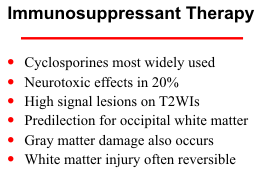Posterior Reversible Encephalopathy Syndrome
The posterior reversible encephalopathy syndrome (PRES) describes the combination of
posterior cerebral involvement and brain dysfunction that occurs with this entity. Patients may
present with headache, confusion, visual disturbance, and seizures. Several diseases and
clinical conditions are associated with PRES, but the root cause seems to be acute or
subacutely elevated blood pressure. Hypertension can occur with drug ingestion, chronic renal
disease, autoimmune nephritis (systemic lupus erythematosus), Wegener's granulomatosis,
acute renovascular hypertension, pheochromocytoma, preeclampsia and eclampsia, and
immunosuppressant therapy.
![]()
MRI reveals lesions with high signal intensity on FLAIR and T2 weighted nonenhanced
images. There is a predilection for the posterior cerebral white matter, and in severe cases
the adjacent gray matter can be involved. Extension into the frontal lobes is not uncommon,
but isolated anterior white matter involvement is unusual. Contrast enhancement is patchy if
present at all. The white matter lesions of PRES do not exhibit restricted diffusion.
![]() The
white matter injury is largely reversible. At least, with correction of the hypertension, the MRI
findings resolve within a few weeks and follow clinical recovery.
The
white matter injury is largely reversible. At least, with correction of the hypertension, the MRI
findings resolve within a few weeks and follow clinical recovery.

Several immunosuppressive agents have been associated with PRES. The cyclosporins
are the most widely used, and neurological complications occur in about 20 per cent of
transplant patients receiving these agents. Cyclosporine has been shown to induce endothelial
release of vasoactive mediators. Hypertension is present in 90% of patients, especially when
combined with steroids. Although cyclo-
sporine may have some direct neuro-toxicity
on the myelin, symptoms and imaging are like
those of hypertensive encephalopathy.
![]() White
matter damage has also been reported with
tacrolimus (FK 506), another commonly used
immunosuppressant drug. Sudden changes in
electrolyte or fluid balance can occur due to
diarrhea, poly- or oliguria.
White
matter damage has also been reported with
tacrolimus (FK 506), another commonly used
immunosuppressant drug. Sudden changes in
electrolyte or fluid balance can occur due to
diarrhea, poly- or oliguria.
![]()
{To return to cases, use the "Back " button on the Toolbar}